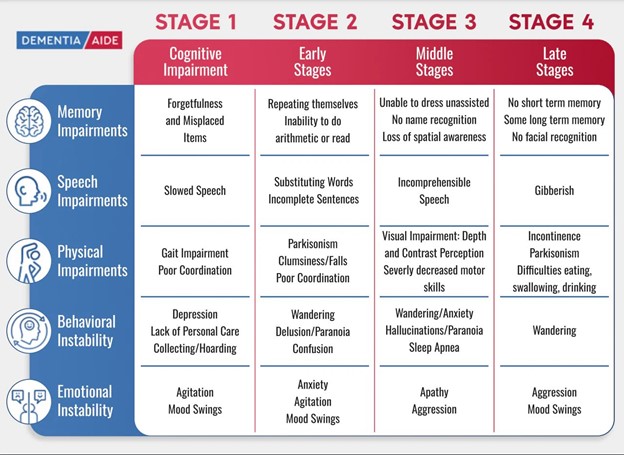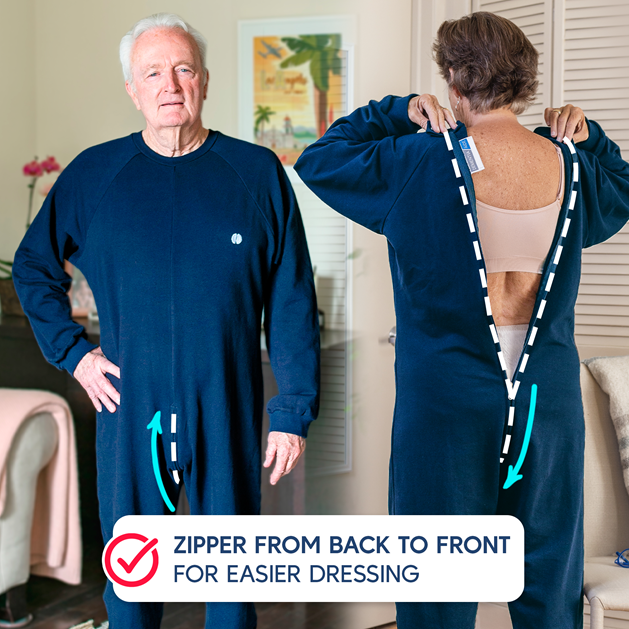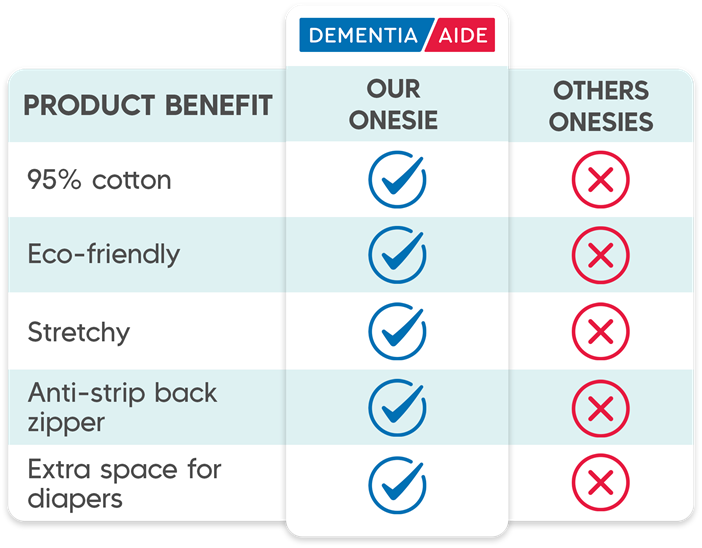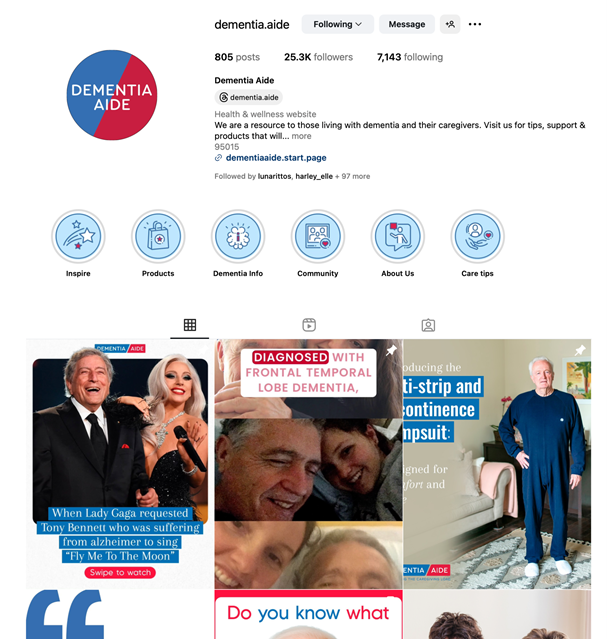
Introduction: Embracing the Dementia Journey: Finding Strength and Support with Dementia Aide
The journey of dementia profoundly impacts individuals and their families, often bringing feelings of overwhelm and isolation. In this challenging landscape, organizations offering support and practical solutions become invaluable partners. Dementia Aide stands as a beacon of information, community, and practical solutions, guiding families through this intricate path. Founded on two decades of personal experience caring for a loved one, Dementia Aide embodies the principle, “From our family, to yours”. This report provides insights into comprehensive dementia care, drawing upon Dementia Aide’s resources, community focus, and innovative solutions designed to ease the caregiving burden.
Understanding Dementia: Laying the Foundation for Informed Care
Effective dementia care begins with a clear understanding of the condition. “Dementia” is an umbrella term for symptoms impairing cognitive functions like memory and reasoning, with Alzheimer’s disease being the most common cause.
Demystifying Dementia and Alzheimer’s Disease: Key Distinctions and Shared Realities
While “dementia” describes symptoms, “Alzheimer’s disease” is a specific neurodegenerative condition. Alzheimer’s typically begins with memory loss. In contrast, Lewy Body Dementia (LBD) often starts with emotional changes, hallucinations, and motor difficulties. Vascular Dementia (VD) presents with motor issues and executive function challenges , while Fronto-Temporal Dementia (FTD) shows early changes in behavior, personality, or language.Understanding these distinctions helps caregivers. Dementia Aide’s dedicated pages for each type serve as invaluable learning resources.
Brief Overview of Other Common Types and Their Unique Challenges
Dementia Aide provides in-depth information on other significant forms of dementia:
● Alzheimer’s Disease (AD): The most common cause of dementia, characterized by gradual memory loss, difficulty with problem-solving and reasoning, and changes in behavior or personality. Typically begins with short-term memory impairment and progresses to affect communication, orientation, and daily functioning.
● Fronto-Temporal Dementia (FTD): Degeneration in frontal/temporal lobes, leading to behavioral changes or language loss. Often earlier onset (45-65 years).
● Lewy Body Dementia (LBD): Abnormal protein deposits (Lewy bodies) cause fluctuating cognition, visual hallucinations, and Parkinsonism.
● Vascular Dementia (VD): Brain damage from impaired blood supply (strokes), causing stepwise cognitive decline, often affecting executive function and physical abilities first.
The Importance of Early Recognition and Diagnosis
Dementia diagnosis is complex, relying on brain imaging, blood tests, cognitive assessments, and symptom progression. Early recognition of signs, is crucial for timely medical consultation and proactive care. While Dementia Aide simplifies complex topics, it is a powerful information curator; always consult healthcare professionals for definitive advice.
How the Disease Progresses: The Stages of Dementia
Dementia advances over time, with symptoms affecting memory, speech, physical ability, behavior, and emotional stability. While the pace varies, these four stages outline the common progression:
● Stage 1 – Cognitive Impairment: Early signs include forgetfulness, slowed speech, poor coordination, and mood swings. Some may show depression or hoarding tendencies.
● Stage 2 – Early Stages: Individuals may repeat themselves, have difficulty with reading or arithmetic, and substitute words. Physical changes like clumsiness or Parkinsonism can appear, along with confusion, paranoia, or wandering.
● Stage 3 – Middle Stages: Daily activities like dressing become impossible without help. Speech becomes incomprehensible, vision and motor skills decline, and behavioral symptoms such as hallucinations, paranoia, and aggression may emerge.
● Stage 4 – Late Stages: Severe memory loss includes inability to recognize faces. Speech is often reduced to gibberish. Physical challenges like incontinence, swallowing difficulties, and Parkinsonism are common, along with mood swings or aggression.
Understanding these stages helps caregivers anticipate changing needs and choose the right safety measures, support systems, and products — ensuring dignity and comfort at every stage.
The Art of Dementia Personal Care: Nurturing Well-being at Home
Personal care for individuals with dementia evolves with the condition, encompassing daily tasks, managing behaviors, and ensuring a safe home environment.
Daily Living: Hygiene, Nutrition, and Mobility
As dementia progresses, individuals need increasing assistance with activities of daily living (ADLs) like bathing, grooming, dressing, and toileting. Maintaining hygiene is vital for dignity and health. Nutrition requires careful planning and effort. Mobility issues, including balance problems, increase fall risk. These demanding tasks highlight the need for practical solutions and support.
Addressing Behavioral Changes: Agitation, Wandering, and Repetitive Actions
Behavioral changes are distressing challenges. Agitation often stems from anxiety or confusion. Wandering, a common and dangerous behavior, can be caused by disorientation or avoiding stress. Repetitive actions or talking are frequent due to memory decline. These behaviors take an emotional toll on caregivers, requiring patience and empathy. Dementia’s progressive nature necessitates adaptable approaches and products for different stages and symptoms.
Creating a Safe Haven: Essential Dementia Home Care Services and Safety Measures
Ensuring a safe home environment is paramount due to declining judgment and physical abilities. Proactive safety measures prevent injuries and reduce anxiety. A comprehensive home safety checklist includes:
● Monitoring hazardous areas like garages and basements.
● Kitchen safety: using auto-shutoff appliances, stove knob covers, disconnecting disposals, removing toxic plants.
● Emergency preparedness: keeping emergency contact lists.
● Functional safety devices: smoke/carbon monoxide detectors, fire extinguishers.
● Lock management: installing latches out of sight on exterior doors, removing interior door locks.
● Lighting: well-lit walkways, night lights in key areas.
● Hazard removal: securing weapons, locking medications, removing tripping hazards.
● Temperature control: monitoring water/food temperatures.
● Bedroom/Bathroom safety: monitoring electric blankets, providing seating, securing furniture, installing grab bars, using textured stickers on slippery surfaces.
Many personal care challenges, like incontinence and wandering, pose threats to dignity and safety, creating an urgent need for specialized products.
Empowering Caregivers: Products to Help Dementia Patients Thrive
Thoughtfully designed products enhance the quality of life for individuals with dementia, simplifying tasks, improving safety, and preserving dignity.
Spotlight: The Anti-Strip Jumpsuit: A Solution for Incontinence and Dignity
Dementia Aide’s Anti-Strip Back-zip Jumpsuit is a flagship product born from personal caregiving experience. It offers a simple, effective solution to incontinence, preventing individuals from fidgeting with or removing diapers and clothing, thereby maintaining hygiene and dignity.


The one-piece pajama has a back zipper, making it difficult for the wearer to manipulate but easy for caregivers to use, even for bedridden individuals. Customers praise its comfort, describing the material as “very warm, soft, and of the best quality,” “comfortable,” and “stretchy”.
Customer testimonials highlight its impact:
● Frank: “Absolutely great product. My dad has had so many bathroom accident because of fidgeting with his diapers. This has allowed him to stay dry in the night because he can’t mess with it any longer. The material is very warm, soft, and of the best quality.”
● Annie: “Love this jumpsuit for my Father with Dementia. He is 210lbs and 6ft. The large fit perfectly! I will be buying a few more!”
These accounts show how the jumpsuit prevents inappropriate undressing, preserving dignity and reducing caregiver distress. The jumpsuit is available on Dementia Aide’s website and Amazon.com. Customer service is consistently praised as “great,” “super accommodating,” and “efficient”.
The Anti-Strip Jumpsuit exemplifies how a targeted product significantly improves patient dignity and hygiene while reducing caregiver stress and enhancing home safety. By directly addressing incontinence and inappropriate undressing, it allows patients to stay dry and maintain dignity, easing caregiver burden and improving dementia home care services.
Beyond the Basics: A Holistic Guide to Dementia Care
Comprehensive dementia care extends to practicalities like medication and financial management, and crucially, addresses caregiver well-being.
Navigating the Practicalities: Medication Management and Financial Planning
Caregivers increasingly manage practical aspects of their loved one’s life, including diligent medication management and doctor’s appointments. They often assume significant financial responsibilities, organizing papers, paying bills, and handling legal arrangements like power of attorney. These aspects are integral to a comprehensive guide to dementia care.
The Unseen Burdens: Addressing Caregiver Mental and Physical Well-being
Caregiving for dementia carries immense psychological and physical tolls. Caregivers experience “objective burden” (time/physical demands) and “subjective burden” (emotional perception). This often leads to “psychological morbidity,” with high rates of depression and anxiety, and significant social isolation.
Physical health can deteriorate, with stress-related issues like cardiovascular disease and insomnia. Financial difficulties from lost wages and medical expenses add to stress. The risks of caregiver burnout are severe, manifesting as elevated depression, worsening physical health, and increased mortality risk.
Recognizing these challenges, caregiver self-care and seeking support are paramount. Dementia Aide’s social media promotes caregiver well-being, emphasizing “#SelfCareIsNotSelfish” and that “Caregivers deserve rest, resources, and respect”. The significant financial and emotional burdens on caregivers underscore the critical value of Dementia Aide’s explicit commitment to financial accessibility for their products.
This commitment builds immense trust and loyalty, reinforcing Dementia Aide’s positioning as a community-focused resource rather than purely a commercial entity. It implies that practical solutions must be available to those who need them most, enhancing dementia home care services.
C. Exploring Care Arrangements: In-Home Support, Adult Day Care, and Residential Options
As dementia progresses, care needs evolve, requiring flexible arrangements:
● In-Home Care: Allows individuals to remain at home, with options like companion, personal, homemaker, and medical services.
● Adult Day Care Centers: Provide safe, supervised environments for activities, socialization, and various therapies during the day.
● Residential Care: For middle to late stages, options include Personal Care Homes, Assisted Living Facilities, and Nursing Homes, often with specialized memory care units.
● Short-Term Arrangements: Hospice care for end-of-life comfort, and Geriatric Psychiatric Facilities for severe behavioral changes.
A more detailed overview of care arrangements can be found on the Dementia Aide website.
VI. Building Bridges: The Power of Community and Support
Combating isolation and fostering belonging are crucial for caregiver well-being.
A. You Are Not Alone: Connecting with Support Groups and Online Forums
Social isolation is a common challenge for caregivers. Dementia Aide directs readers to external support groups and online forums from reputable organizations like the Alzheimer’s Association and Lewy Body Dementia Association, as well as specialized Facebook groups and anonymous chat platforms like “7 Cups”. This provides actionable pathways to validated support.
B. Dementia Aide as a Community Hub: Fostering Connection and Shared Experiences
Dementia Aide fosters community through its authentic origin story, rooted in 20 years of personal caregiving experience, cultivating empathy and relatability. They offer a personal invitation: “reach out to us directly… if you just want to talk to someone who is in a similar place as you”.
Their active Facebook presence provides emotional support, shares relatable experiences, and encourages interaction through questions and calls to action. The page also offers educational content on dementia and practical safety tips, while emphasizing caregiver well-being with hashtags like “#SelfCareIsNotSelfish”. This multi-layered strategy combats isolation, transforming a solitary journey into a shared experience, crucial for caregiver mental well-being and sustained capacity to provide dementia personal care and dementia home care services.
We invite you to join the conversation, share your story, and help us spread awareness — because every shared insight can make a difference for another family facing dementia.

C. Commitment to Accessibility: Ensuring Support for All Families
Dementia Aide is deeply committed to ensuring support regardless of financial situation: “If you or a loved one is in need of our products but cannot afford them, please do not hesitate to reach out to us… we will work together to find a solution”. This powerful statement sets Dementia Aide apart as a mission-driven organization, building trust and demonstrating a profound understanding of caregivers’ economic realities.
VII. Conclusion: A Future of Compassion and Connection: Your Partner in Dementia Care
The dementia journey is complex, requiring informed care, practical solutions, and robust support. Dementia Aide stands as a comprehensive resource, offering detailed information on dementia types and guiding caregivers. Its innovative products, like the Anti-Strip Jumpsuit, directly address daily challenges, enhancing patient comfort and dignity while easing caregiver burden. Beyond products, Dementia Aide cultivates a compassionate community, rooted in personal experience, combating social isolation and fostering resilience. Its unique commitment to financial accessibility underscores its dedication to supporting all families. Ultimately, Dementia Aide is a dedicated partner, providing essential tools, information, and vital community for navigating the dementia journey with greater dignity, support, and peace of mind.











